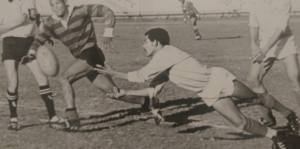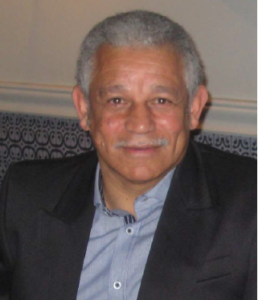In the 15th instalment of a series on black rugby legends, GARY BOSHOFF looks back at the career of former Saru scrumhalf and captain Julian Smith.
EARLY LIFE
Prof Julian Smith was born in Robertson in the Cape winelands, but grew up in the picturesque village of McGregor, about 18km away. His parents, Julie and Milly, hail from families with strong sporting backgrounds. They managed to instil this affinity with sport in their children which, Smith says, laid the foundation for his sporting achievements.
He attended the Methodist Primary School in McGregor where his father was the principal where rugby was the most popular sport for young boys. Julie – who had played wing for the local rugby club, Robertson Town RFC, encouraged and supported his son from the outset.
‘The rural setting of McGregor, together with my siblings’ enthusiastic participation in anything sport-linked, most definitely contributed significantly to my skill levels for rugby,’ says Smith. ‘My brothers [Daniel, Arthur and Roy] and I would play rugby on the sidewalks and among the apricot trees for hours. We had to negotiate the confined spaces and sidestep defenders and trees at the same time.’
Smith would later realise how the accumulation of these experiences resulted in his unique skill set for the game. As a teenager he attended Langeberg Intermediary School (which only went up to Grade 10 at the time). In his first year he was appointed captain of the 2nd XV, which was in fact the school’s 1st XV. In those days, school rugby teams were categorised according to the weight of the players. He acknowledges the support and encouragement he received from physical education teacher Frankie Issel.
While at Langeberg, Smith started to focus on how he could grow his tactical awareness of the game and utilise it to outwit the opposition. He also realised the importance of fitness and how this, together with mental and tactical superiority, almost always gave him and his team the edge over the opposition.
In 1970, he moved to Esselenpark Secondary School in Worcester for his final two years of schooling. He recalls how principal Abie Arendse was able to ensure that the 1st XV coach selected him at flyhalf because of his tactical awareness and ability to read the game, in spite of him still being within the 3rd XV weight limit.
However, it was the school rugby coach, Errol Adams, who was Smith’s role model, teaching him discipline, commitment and selflessness during the formative years of his teens.
In his matric year, Smith showed his activist side for the first time when he and a few teammates boycotted the final Boland Schools trials in protest against what they viewed as biased team selections.
RUGBY CAREER
Smith enrolled for a BA degree at the University of the Western Cape (UWC) in 1972, and was selected for its 1st XV and the Bellville Union Board team that year, a remarkable achievement.
In 1974, UWC joined the newly-formed Tygerberg Rugby Union, which was affiliated to the South African Rugby Union (Saru). Conditions were poor, with no change rooms available at the university fields.
‘It was really embarrassing and degrading, to say the least,’ Smith recalls. ‘We had to change behind the bushes, with no toilet or ablution facilities available for us or the visiting sides.’
He captained UWC from 1974 to 1976 and represented Tygerberg RFU from 1974 to 1977. In 1974, UWC won the league and the Grand Challenge competitions of the Tygerberg RFU – one of the highlights of his career as a student.
In 1977, Smith decided to leave UWC and join Tigers RFC because of the growing academic and administrative load he had to carry at UWC RFC. He wanted to concentrate more on his game to challenge for Saru colours. That year, Tigers RFC won the league and Grand Challenge trophies of the Tygerberg RFU.
In 1976 and 1977, while teaching at Bishop Lavis Secondary School, Smith completed his honours degree and then returned to Robertson to teach at his alma mater, Langeberg Secondary School. From 1978 to 1981, he was captain of Robertson and South Western Districts (SWD) and completed his masters degree. During that period, SWD (who competed in the second division of Saru) played in two Rhodes Tournament finals.
Smith returned to UWC in 1982 to lecture in the Afrikaans-Nederlands department. Another highlight that year was when he was selected as Saru captain and helped UWC RFC to yet another league title.

At the young age of 29, Smith decided to retire, so that he could spend more time with his family and concentrate on his academic career. He had achieved the highest accolade in rugby and had nothing left to aspire to.
‘I definitely had a few more years left in me, but felt that my family deserved more of my time and I opted to retire from the game I grew up in and loved so much.’
The wily genius from McGregor has huge admiration for the many black rugby stars who played the game in relative obscurity and without the recognition they deserved.
In particular, he recognises the abilities and skills of players like Peter Mkata (the Kwaru flyhalf whose spatial awareness and ability to read the game was of the highest quality), Temba Ludwaba (the burly Kwaru lock forward), Salie Fredericks (WP lock), Clive Thomas (Tygerberg RFU No 8), Timmy Gelderbloem (City and Suburban scrumhalf), Clemmie Strydom (SWD utility back), Walter Herman (UWC flyhalf), Archie Mkhele (Kwaru flank), Desmond Kramer (EP wing) and Desmond Booysen (EP wing).
Smith also pays special homage to UWC, Tygerberg and Saru coach Harry Abrahams, and Tygerberg and Saru coach Millin Petersen, two of the iconic personalities of Saru rugby.
LIFE AFTER RUGBY
Immediately after announcing his retirement from rugby, Smith was appointed as head coach of the UWC RFC. He also assisted the Tygerberg RFU from time to time. However, due to a heavy academic programme, he left coaching in 1985, which allowed him to complete his doctorate in 1987.
That same year he took a stance against the violence and thuggery that characterised the game at the time. He went as far as to distance himself from Saru because of the federation’s inaction on the matter.
With a renewed focus on his university career, he was appointed as UWC registrar in 1991. In 2000, he accepted the position of vice-rector at the University of Stellenbosch, where he played a leading role during a very difficult period at tertiary institutions in South Africa.

University of Stellenbosch
Smith pioneered transformational projects at the university and played a key role in forging a new identity for an institution that was once a beacon of apartheid. During this time, he declined the Springbok blazer offered to him by Sarfu and penned several newspaper articles that were critical of the rugby establishment. He retired from the university in 2015.
Notwithstanding this, during this period he still managed to serve the sport as a member of Saru’s rugby transformation committee (1998 to 2000). He was part of Saru’s investigation into the alleged racism in the Geo Cronjé/Quinton Davids matter (2003) and served as an ombudsman for Saru (from 2005) and as a member of the panel that appointed Peter de Villiers as Springbok coach (2008).
Smith is married to his wife of 39 years, Virginia (his staunchest supporter and most honest critic), and has two daughters, Janine, a medical doctor, and Cherice, a corporate communications professional.
The former academic is hard at work to finish his autobiography, which, he states, ‘contains several revelations that can be regarded as controversial’.
Knowing the professor, the book will reflect his frank and fearless critique of the rugby system and certainly give the reader a unique insight into some of the lesser known historical realities of the game, his personal challenges and achievements and a fascinating perspective on the future of the game.
– This article first appeared in the June 2018 issue of SA Rugby magazine





